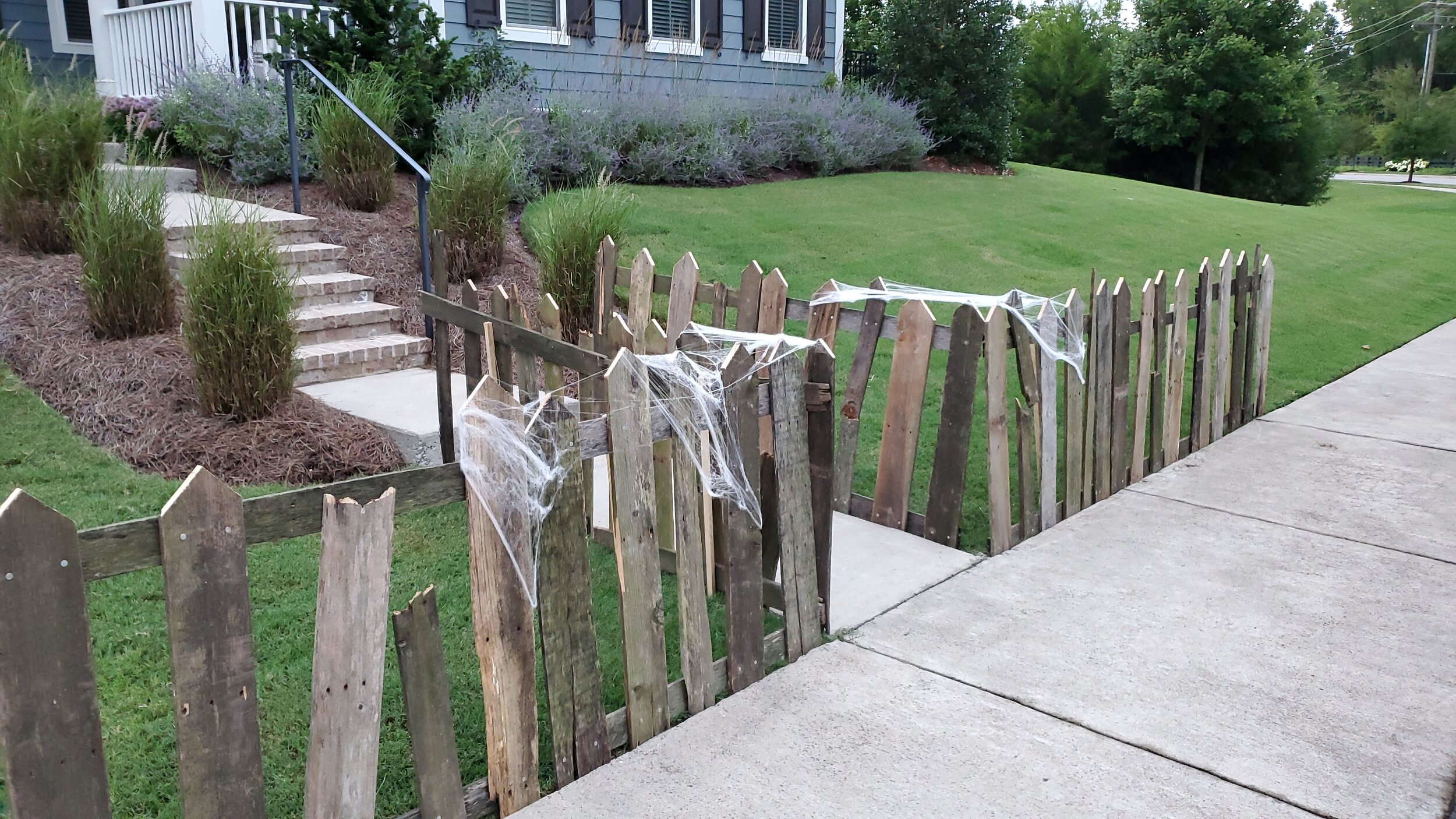Haunted Halloween DIY Pallet Fence
Haunted DIY Pallet Fence
As the days begin to shorten and cooler weather ushers in, I cannot help but think about one of my favorite holidays to decorate for…Halloween! Ranking at the top of my list (aside from Christmas of course!), Halloween affords one the ability to really get creative with setup and put together some terrifyingly tasteful decorations without breaking the bank! For this DIY project, I decided to add a bit of spookiness to our front walk by creating a haunted fence out of weathered pallets. Read on to learn how to create this super easy fence, guaranteed to frighten up your front yard!
Tool Inventory
What DID I NEED?
(6) Weathered/Rotting Wooden Pallets
Sledgehammer and a Hammer
Flat-Headed Screwdriver or Pry Bar
1’’ and 1.25’’ Metal Roofing Nails
Cutting Method - Miter Saw
(10) Wooden Garden Stakes
Galvanized Steel Hanger Strap
How Much Did It Cost?
This project is a two-thumbs up for coming in under $20 to complete! Obviously the main items needed are wooden pallets however these can normally be found for free by perusing Craigslist, Nextdoor, Facebook Marketplace or even local businesses. I ended up purchasing the 1’’ and 1.25’’ roofing nails from Home Depot which ran about $4 each for a box of 100 along with (10) wooden garden stakes, about a dollar a piece. I already had in my toolbox the metal hanger strap (to help affix the fence to the staking poles) along with the hammer, sledge, screwdriver and miter saw. Do not feel like you have to have a miter or electric saw either; the pallet boards are not that wide once deconstructed and they can be easily cut by a handsaw with just a bit of sweat equity.
Pallet Delivery
To get started, I was lucky enough to find (6) nicely weathered and rotting pallets for free from a good friend. The pallets fit perfectly in the back of my Subaru Forester and had the exact look I was aiming for. Once home, I got started on the deconstruction process which took a few hours. If you have never taken apart pallets before be aware there is a major risk for cutting/pricking yourself on the rusty nails. Keep safety in mind so there is no need for a Tetanus shot!
To break down the pallets, I stood the pallets on their side and used the sledgehammer to break apart the inner boards in which the top and bottom boards (i.e. the ones I would be using for the fence pickets) were nailed to. After busting up the center pieces, I used my hammer and screwdriver (on occasion) to pull out all the rusty nails, collecting them in a cup for disposal. The process can be tedious however is definitely worth it when all the boards have been taken apart and are nail-free.
Deconstruction in Progress!
Finished, Nail-Free Pallet Board Pile
After a bit of sweeping and vacuuming to tidy up the mess I had made, I was ready to begin to assemble the fence sections. I popped out to the front yard and measured the area I was going to be putting the fence to ensure I made enough sections. As luck would have it, the total length was 27 feet which turned out to be the perfect length my 6 pallets would turn into.
Measure Your Desired Location for the Fence
To begin the assembly process, I picked through my pile to find (2) boards in which I was going to nail the pickets to. I chose boards that were not rotten to be sure anything I nailed to it would not fall apart. Once lying horizontal and parallel to each other on the ground, I gave them a quick measure which turned out to be 3 and a half feet long. With this in mind, I knew I needed to have roughly 9 fence sections to cover my desired area.
As the boards varied from about 3 and a half to 4 feet long, I decided I wanted the fence to be about 3 feet tall…a height good enough to keep the ghosts from getting out! With a rough measure and cut to the first picket and then eyeballing the rest, I used the miter saw to chop the boards to length, with 2 final 45 degree angle chops to create the pointed top.
Measure One to Length, Eyeball the Rest
Imperfection is Key
Once cut to size, I began the process of laying out the pickets on the 2 main support/mounting boards. I averaged about 4-5 pickets per fence section and had to give myself a mental check to ensure I was not assembling each section too ‘perfectly’! Envisioning a dilapidated, rotten cemetery fence, I made sure to nail some boards at an angle, use boards that were broken and also vary the height of the fence at times. As the pallet boards varied in thickness, I used either my 1’’ or 1.25’’ nails as appropriate to ensure the bottom of the nail did not protrude through the back. Once I had one fence section assembled, I slid it over on the ground and began to assemble the next, using the first as a rough guide to at least ensure I was placing the 2 support boards at the same height for the appearance of one, solid fence.
Two Fence Sections Appearing as One
After assembling the 9 fence sections, I was ready to begin the setup process which is very straightforward to do. I brought all the sections to the front yard and laid them out where they would be staked. Using the sledgehammer, I hammered in the garden posts and stood up the fence against them, ensuring the garden post was hidden behind a picket. Once in the desired place, I trimmed a piece of the metal hanger strap and nailed it to the horizontal support board so the strap formed a U-shape around the garden stake, firmly holding the fence section up!
Preparing to Stake Each Fence Section
Once all staked, it is just a matter of adding additional decorations such as faux cobwebs and even yard tombstones or crosses to send shivers down one’s spine!
Faux Cobwebs
Place as Close or as Far Back from the Sidewalk as Desired
Cracked/Broken Pickets Add to the Realism
Frightening Front Walk
Haunted…For Sure!
And there you have it, a super easy and fun DIY to add a bit of haunt to your front yard. With the addition of even more cobwebs, the fence can take on an even more creepy-vibe, especially once the sun sets and the spirits begin to make their rounds!
Do you plan to give this project a try or have any questions or comments? I would love to hear from you! Feel free to comment below or send me an email here!















